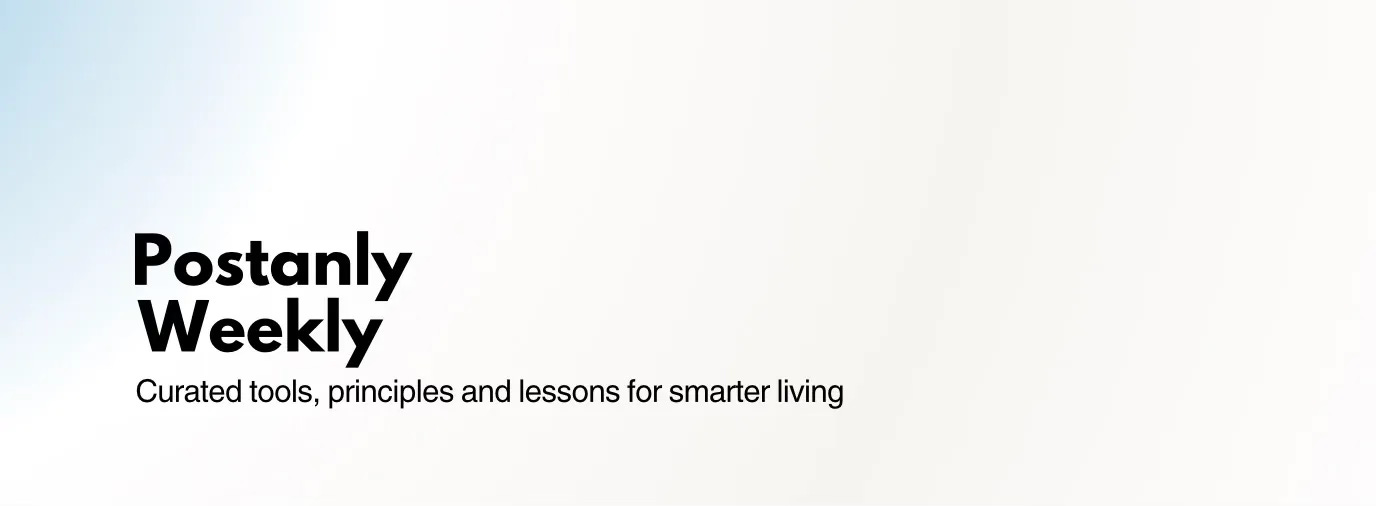40 short habits with a high ROI, smart words from smart people and more
4 new ideas on smarter living
Hello everyone,
Postanly Weekly is a reader-supported smarter living newsletter. To maximise impact, all issues in the future will be FREE. To support my work, you can upgrade to a paid subscription for $6 per month or $40 for an entire year. Bonus courses for supporters: an invite to Thinking Toolbox (mental models for life) and Mental Wealth Toolbox (practical concepts for smarter decisions).
40 short habits that have a high return on investment
Life only gets better on purpose.
Design your day, month or year with specific goals in mind. Pay attention to your daily routines and behaviours; they set you up for better or worse.
F.M. Alexander is right, ”People do not decide their future, they decide their habits and their habits decide their future.”
Until you change something you do today, you will never change your life tomorrow. And knowledge of good habits doesn’t change us; we have to practice them to get different but better outcomes.
These are a few habits that have a massive return on investment in life. Focus on one habit at a time. You don’t have to disrupt your current schedule. Start small and make the change one habit at a time.
Start your day on purpose: identify your MIT’s (most important tasks) the night before and start ticking them off first thing in the morning.
Tackle high-value tasks before 12 pm.
I can’t stress lifelong learning enough. Read for at least 15 minutes every day: your life will be 37x better in a year.
Saving is good but investing is better. Invest a percentage (you choose) of what you earn in a less risky index fund. Put compound growth to work.
Hydrate. Hydrate. Hydrate. Water your brain. If your water level is low, your brain cells shrink, and you also get brain fog. Coffee doesn’t count.
Add more whole foods, fibre and vegetables to your diet. Prioritise your health; the next 10 or 20 years of your life depend on it.
Nurture meaningful and strong social connections: your happiness depends on them.
A side hustle can help you figure out what you want to do with your life.Spend some time exploring your curiosities.
Learn to question common sense — we don’t question our beliefs, assumptions and beliefs enough. To find better answers, ask why.
Audit your content sources once every month. It saves time and improves knowledge acquisition.
Design a starting ritual for your work; it reduces your decision-making process and saves cognitive energy for important things.
Spend more time in nature. It’s a simple habit that improves your mood and mental clarity.
Whatever you do, find time to move every day. It doesn’t matter how long. It improves blood circulation and helps you think better.
Don’t speed read or skim every book or insightful article. If your aim is knowledge retention, read slowly.
Try sprinting at least once a week: It will strengthen your cardiac muscles and improve blood circulation.
Sit with yourself for a few minutes a day to declutter your brain. It can reduce stress.
Start a new day as if you have something new to learn, and chances are you will. Keep an open mind for growth purposes.
Early to bed, early to rise. Your days will feel longer if you can get to bed earlier than usual.
Cut back alcohol and caffeine in the evening: a good sleep depends on it.
Group your worries into two: those you can control and those you can’t.Do something about what you can change and stop stressing about things you have no control over.
Don’t sweat the small, unimportant details. For everything you worry about, ask yourself: will it matter tomorrow, next month or year.
Design a morning routine that works for your mind and body. Start your day on a good note.
Start a hobby or passion project outside work that makes you come alive.
Read at least one profound essay to improve your perception of life and live it every day.
Create a motivational playlist for your exercise routine: something to look forward to can help sustain the habit. “The right playlist can transform your experience of exercise,” says Kelly McGonigal.
Spend a few minutes every night to write down your worries or thoughts as they appear.
Start a lifelong learning habit: tune into relevant essays, documentaries, videos, books and courses.
Cap your daily most important tasks: 3 at most.
Try the one-tab work habit to improve your focus: don’t open another tab when working until that specific task is complete.
Limit the news: focus on a few credible sources and turn off news notifications.
Declutter your personal workspace before you call it a day.
Repressing your emotions makes you worry more; talk about them, speak to someone about them or tell your loved ones how you feel.
Appreciate the even smallest everyday experiences: they can improve your mood. Be more present and observant.
Spend quality time with people who empower and bring out the best in you; your happiness depends on it.
Don’t aim for 10,000 steps a day; it’s not sustainable. Aim for a consistent walking habit; the goal is to make it to do it every day.
Stop spending too much time in your head. It robs you the present and increases stress and anxiety.
Distractions are everywhere. Record them to block them and watch your productivity soar.
Take full responsibility for your happiness; no one can make you happy forever. Do more of what makes you come alive.
Change things up once a month; use a different route, read a book you usually ignore, talk to a stranger, or surprise someone you love. It puts your brain to work and makes you think.
Finally, remember what Gretchen Rubin said, “What you do every day matters more than what you do once in a while.
Food for thought
Smart Words From Smart People [Collab Blog]
“A great way to understand yourself is to seriously reflect on everything you find irritating in others.” – Kevin Kelly
It’s good to be optimistic in the general and skeptical in the specific. It’s very dangerous to be pessimistic in the general and optimistic in the specific. – Naval (paraphrasing)
“When momentum is on your side, people focus on your strengths and forgive your weaknesses. When the momentum stops, they scrutinize the whole thing.” – Packy McCormick
The soft life: why millennials are quitting the rat race [The Guardian]
“For millennials and the younger generation Z and Alphas, who may never be able to afford to buy a home or retire at a reasonable age, there is a growing feeling online that hard work is fortifying a system that, at best, is giving them nothing back and, at worst, is actively screwing them over. And so the “soft life” revolution was born – where the priority is no longer about working yourself to the bone…”
Struggle getting out of bed in the morning? Marcus Aurelius can help [Big Think]
“Like Socrates, Marcus Aurelius believes that evil is a form of ignorance, and that an unflinching trust in reason can keep both at bay. Like Socrates, the emperor also believes that exercising self-control leads to both freedom and happiness. Because bodily desires can never be permanently satisfied, people should practice moderation rather than overindulgence.”
The Power of Changing Your Mind [Time]
“There are five stages of change, often used to work with individuals who struggle with addiction or eating disorders, that are helpful to consider in this moment: precontemplation, contemplation, preparation, action, maintenance. Someone who is precontemplative is going to be resistant to outreach, because they are not considering change.”
4 ideas on smarter living
What Does Intellectual Humility Look Like?
“People who are intellectually humble know that their beliefs, opinions, and viewpoints are fallible because they realize that the evidence on which their beliefs are based could be limited or flawed or that they may not have the expertise or ability to understand and evaluate the evidence. Intellectual humility involves understanding that we can’t fully trust our beliefs and opinions because we might be relying on faulty or incomplete information or are incapable of understanding the details.” —source
A concept worth understanding
Accepting duality: if you have flaws (and we all have flaws), then it is okay for other people to have flaws too. Nobody is perfect.
A piece of advice worth passing on
My daughter loves to play on her tablet but hate to tidy her playroom. If we both want to win then I might let her play on her device only after she has put away her toys. This is known as the Premack’s Principle: more probable behaviours reinforce less probable ones.
An activity worth doing
Go for a walk in nature every day, if you can. Switching off devices and just being present in the moment makes you realise just how insignificant you (and your problems) are.
Tools to make life easier
Meco — Read all your awesome newsletters on a single app. Meco is a distraction-free space for reading and discovering newsletters, separate from the inbox. Add your newsletters in seconds and liberate your inbox. Move your newsletters to a space built for reading and declutter your inbox in seconds. Enjoy newsletters in a space designed for reading. Learn More
Morning Brew covers the latest news across business, finance, and tech in the most digestible way to save you time. The day's most important stories into a short, quick, and entertaining read. It’s read by over 4 million professionals. I read it every day. Try it, it’s free.
Work with Postanly. Partner with us here.
Thanks for reading!
Until next week,
Thomas
Medium | Thinking Toolbox | The Write Life | How to Live: Lessons in Stoicism
Postanly Weekly is now a reader-supported publication. To support my work, you can upgrade to a paid subscription for $6 per month or $40 for an entire year. Bonus courses for supporters: an invite to Thinking Toolbox (mental models for life) and Mental Wealth Toolbox (practical concepts for smarter decisions).





Quite the list. #40 speaks volumes to me right now in so many ways.
INCREDIBLE list 👏🏻